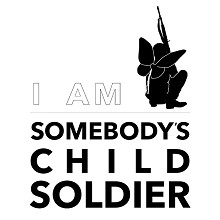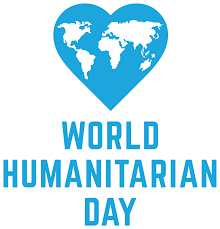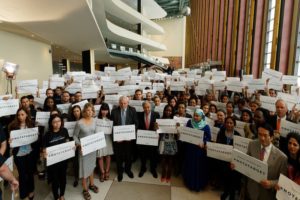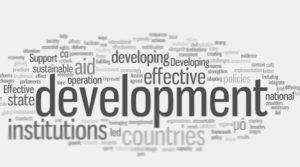Aid workers’ role: encouraging development in poor countries
Stressing the great work of aid workers around the world, UN Secretary-General Antonio Guterres thanked them for their unfailing support of people in vulnerable situations. He also pledged his support to people affected by crises, as the 2017 WHD campaign – #NotATarget – focused on the role of conflict in affecting millions of civilian lives. I am Somebody’s Child Soldier (IamSCS) wants to join Mr Guterres in giving credit to aid workers for their tremendous efforts, as the 19th of August marks World Humanitarian Day (WHD). What better way to pay tribute to their vast contribution than to review the type of work international organisations and agencies are doing?
Humanitarian field: diversity of programmes for varied issues
The humanitarian sector addresses both humanitarian crises and economic and social development, as its main purpose is to protect life and health and ensure respect for human beings. Regardless of the initiatives each actor supports, coordination in the decision-making process between international humanitarians and national and local responders is crucial. The transparency of information related to projects and programmes leads to greater reliance on humanitarian organisations and allows these organisations to access sufficient funds for their humanitarian relief efforts.
Relief work
Some charities specialise in helping people whose lives and livelihoods have been shattered by conflict and/or disaster. These aid workers are the first ones to arrive in the affected areas and provide relief to individuals in various ways: health workers provide care and save lives and other aid workers provide shelter through displacement centres, clean water, sanitarian facilities and handwashing stations, essential medicines and food.
To respond efficiently to a humanitarian crisis, United Nations (UN) agencies, relief agencies, national politicians and local communities need to coordinate their actions and efforts. To provide assistance, resources also need to be deployed. In this regard, the international community plays a huge role.
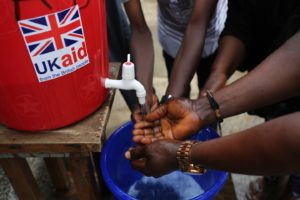
Ukaid provides clean water as a response to a deadly landslide in Sierra Leone – August 2017 – Credit UNICEF SL/2017/James.
The work of these international organisations allows people to survive, recover, and hope for a better future. Along with their relief work, some international organisations also work on development programmes. Others, like IamSCS, focus their attention on economic development, promoting leadership skills, social responsibility and positive change to their beneficiaries and local communities.
Development programmes
People who are recovering from conflict – as are the beneficiaries of IamSCS in Uganda – are in need of support in various aspects of daily life. Hence, a range of programmes is implemented which includes health, safety, education, community economic development, culture, economic wellbeing and empowerment. Overall, aid can support poverty reduction and poverty eradication and/or it can support peace building, security, resilience and better governance.
Firstly, in terms of health and healthcare, a large number of international organisations operate to enable people to gain access to vaccinations, primary and reproductive health care as well as access to clean drinking water and sanitation facilities. To mitigate the effects of existing illnesses, especially the mental illnesses of resettled children affected by conflict and disasters, psychosocial support programmes are created. Thus, programmes in dance, meditation, drama therapy and those dedicated to other outlets for artistic and creative expression have been founded.
Another factor that contributes to development and reduces poverty is equitable quality education for all. Educational opportunities are provided by a large number of humanitarian actors. From basic learning to job-related skills training, youth and older individuals benefit from a quality education thanks to the hard work of the humanitarian sector and national and local governments. Furthermore, support for businesses is strongly present in developing countries where the beneficiaries – most of whom are women – have access to financial services, cash and asset transfers as well as meeting places to discuss their issues.
Finally, refugees and people who are victims of trauma are also given social and legal assistance, resettlement support or are even offered information on how to prevent and respond to human rights abuses.
#NotATarget
Working in the humanitarian field can be hugely rewarding: helping people, giving them hope and opportunities, meeting a diversity of individuals, collecting personal testimonies and gleaning information are just some of the gains associated with humanitarian work. At the same time, working in war-affected areas and/or in developing countries with a lack of basic infrastructure can have dramatic consequences. Workers risk their lives as they can be kidnapped or attacked in the midst of conflict or disasters. IamSCS advocates for the lives of former child soldiers and women returnees who saw their lives changed by the 20-year conflict in Uganda. Our charity also encourages the protection of all civilians in conflict and disaster zones around the world. This blog illustrates that the path to progress necessarily takes time and much effort. Charities need your support to achieve their objectives. With you, IamSCS will continue to make economic and developmental progress in Uganda. Thank you.
Sources:
http://worldhumanitarianday.org/en
http://www.deseretnews.com/article/865687465/Christian-groups-respond-to-growing-Sudanese-refugee-crisis.html
https://medium.com/@unicefsierraleone1/seven-days-later-responding-to-a-deadly-landslide-in-sierra-leone-b358134b21a7
